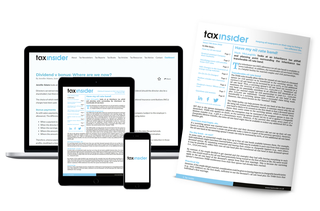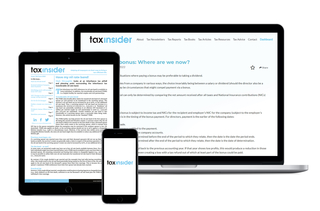Tax Insider
Subscribe to our monthly tax newsletter and tax article library and receive news, tips and strategies guaranteed to minimise your tax bill
 DIGITAL & PRINT
DIGITAL & PRINT
- 14 day free trial
- Up to date monthly tax saving tips
- New tax strategies added every month (48 over the year)
- No minimum tie-ins, cancel anytime
Tax Insider Library subscription benefits
We recently asked our subscribers what they love about the Tax Insider Library.
These are the top 7 reasons that they gave us:
-
Guaranteed ROI After 90 days, if you've not saved money on your tax bill we'll give you a prompt refund
-
Proactive We bring relevant, actionable tax saving opportunities directly to you
-
Time saving Don't waste your precious time searching for answers to tax questions on the Internet
-
Powerful Use our data, articles and information to take control of your finances
-
Safe Keep up to date, so you don't get caught out by new rules and regulations
-
Simplifying Our publications simplify complex tax rules into easily digestible, actionable points
-
Balanced We help you find a balance between saving money versus ethical & legal compliance
Here are just some of the strategies our tax experts are sharing with subscribers this month
-
Trust or limited company?
When considering making an investment, two of the main issues are a good return and an exit strategy. As well as the performance of the investment itself, how to hold it is another matter. Personal income tax rates and those on subsequent capital gains tax (CGT) on disposal, and potentially inheritance tax (IHT), may make holding something personally an unattractive option.
Chris Thorpe looks at which vehicle an investor should use.
-
Unincorporated traders: More changes ahead
Unincorporated trading businesses are going through their biggest tax change for a generation, with the switch to a tax year basis of assessment replacing the ‘basis period’ system for 2024/25. The tax year 2023/24 is a transition year with special rules. Further change is now on the way.
Kevin Read explains why some trading businesses face a big decision.
-
Main residence exemption and the required ‘quality of occupation’
The exemption from capital gains tax (CGT) for a dwelling that is the taxpayer’s ‘only or main residence’ is an important one for homeowners. The value of the exemption means that some may be tempted to claim it on properties that may not clearly fall within its parameters. We must therefore look at what is meant by an only or main residence.
Richard Curtis considers the capital gains tax only or main residence exemption and the required ‘quality of occupation’.
-
VAT: DIY billing!
Usually, it's the supplier who issues a VAT invoice; but in some circumstances, the customer prepares the invoice instead and gives the supplier a copy. This system is called 'self-billing'. Any business can use this procedure, so long as certain conditions are met.
Andrew Needham looks at the workings of the self-billing system and how it can be helpful for businesses.
-
How will planning can help to reduce inheritance tax liabilities
In April 2023, the National Will Register reported that 42% of adults in the UK had not made any provisions for their estate distribution in the event of death.
Moneeza Siddiqui looks at how will planning can help to reduce inheritance tax liabilities.
-
Employee expenses: Are P11D returns finally no more?
The strict application of the rule for allowable expenses would require all expense payments to employees to be treated as employment income, leaving the employee to claim relief for the allowable part separately. In addition, an employer is required to notify HMRC of all expenses paid to an employee, even if the employee incurs the expense on the employer’s behalf.
Jennifer Adams reviews the current use of form P11D and asks - is the form finally no more?
-
Where there’s a will!
No-one likes to think about their death, so it is perhaps understandable that many people put off drafting their will, and some die without having made a will.
Mark McLaughlin looks at the importance of making a will, and some inheritance tax and other implications of intestacy.
-
Q&As with Arthur Weller
Our articles from March 2024
-
Possible alternatives to salary and dividends
Many in business will trade through the medium of a limited company and the directors will generally be remunerated by the payment of dividends or salary. The former are taxed on the recipient and must be paid out of profits subject to corporation tax, while the latter are subject to National Insurance contributions (NICs) as well as income tax.
Richard Curtis suggests possible alternatives to salary and dividends.
-
Personal car or company car?
Given the reliance on and impact of cars, special tax rules are in place to manage the environmental footprint of vehicles.
Moneeza Siddiqui compares the tax implications of a personal and company car when used in an individual’s employment.
-
VAT: Service charges on commercial property
It is common for leases between landlords and tenants to give details of what services the landlord shall provide and what the tenants shall pay for the upkeep of the building as a whole. The lease may provide for an inclusive rental, or it may require the tenants to contribute by means of an additional charge to the basic rent. These charges are generally referred to as service charges, maintenance charges or additional rent.
Andrew Needham looks at the VAT position of service charges on commercial property.
-
Important considerations when extracting profits from companies
Once a sole trader or partnership has incorporated, the owner or partners can no longer help themselves to the business’s profits at will; such individuals were previously subject to income tax and National Insurance contributions (NICs) based on those profits, irrespective of how much they took from the business.
Chris Thorpe looks at some considerations when extracting profits out of limited companies.
-
What’s in a name? Distributions in specie
I was asked a question recently about a transfer of shares between a 60% subsidiary to its holding company and whether this would be better structured as a dividend in specie or a distribution in specie. I was initially thrown by the question; surely, they are the same thing? Of course, from a corporation tax point of view, it makes little odds since what some of us still call ‘Schedule F’ income is exempted by (CTA 2009, s 931B).
Ken Moody highlights some confusion over what exactly are ‘distributions in specie’ and outlines some important tax implications.
-
Short-term Company loans for company owners
The cheapest personal bank loan rates are double what they were 18 months ago, though this has stabilised recently. Currently, the best loan interest rate between £7,000 and £25,000 is 5.9%.
Jennifer Adams explores where company owners might get useful short-term loans.
-
‘By reason of employment’ - its significance for tax purposes
The UK tax system is full of potential surprises. For example, it sometimes treats certain situations and events as having occurred, which did not necessarily happen in the ‘real’ world.
Mark McLaughlin looks at what ‘by reason of employment’ means and a Supreme Court decision highlighting its significance for tax purposes.
-
Q&As with Arthur Weller
Our articles from February 2024
-
Helping the kids with their mortgages?
These are difficult times for most young people buying their first home, or for recent first-time buyers trying to keep up with their mortgage payments. Some offspring will need help from their parents to get (or stay) on the property ladder.
Mark McLaughlin looks at some inheritance tax points to consider for parents wishing to help adult offspring manage their mortgage debts.
-
Construction industry: The ‘golden brick’
It is not uncommon, in these cash-strapped times, for construction companies to start work on a housing project and either run out of money or stop building due to a lack of demand for the houses.
Andrew Needham looks at what is known as the ‘golden brick’ and its effect on the VAT treatment of new residential property in the construction industry.
-
Gifting an asset: What does the taxman get?
Surprising loved ones with a gift can potentially backfire on the donor, who may end up with a tax charge in exchange for giving up the asset.
Moneeza Siddiqui outlines tax implications of assets gifted or sold at an undervalue.
-
Tax and the main residence
For most of us, the house in which we live – our ‘only or main residence’ in the terms of the tax legislation – is our most valuable asset. For many of us, it is one that has increased in value substantially over the years.
Richard Curtis considers the basic principles of the capital gains tax exemption for only or main residences.
-
Directorship and employing a company
When deciding whether to incorporate a business, tax is clearly a major factor; but it is not the only one, as a company is a separate legal entity – a body corporate, and one which needs to be properly managed by its officers.
Chris Thorpe points out how a company could benefit a business, and what directorship entails.
-
How does the starting rate band for savings income work?
The starting (savings) rate band for interest income is one of the most difficult concepts for taxation students (and some tax qualified professionals!) to understand, so it is not a surprise that most taxpayers without detailed technical tax teaching, do not understand it either.
Meg Saksida considers the operation and practical implications of the income tax starting rate band for savings.
-
Q&As with Arthur Weller
-
When a benefit-in-kind may not produce a reduction in tax
Remuneration comes in many guises, usually as salaries, bonuses or benefits-in-kind, all being subject to tax and National Insurance contributions (NICs) unless the payment or benefit is specifically exempted (e.g., long-service awards).
Jennifer Adams notes there are instances where choosing to take a benefit-in-kind rather than salary may not produce a reduction in tax or National Insurance contributions for employee or employer.
 DIGITAL & PRINT
DIGITAL & PRINT
- 14 day free trial
- Up to date monthly tax saving tips
- New tax strategies added every month (48 over the year)
- No minimum tie-ins, cancel anytime
OR, if you are ready to save money on your tax bill...
 DIGITAL & PRINT
DIGITAL & PRINT
- 14 day free trial
- Up to date monthly tax saving tips
- New tax strategies added every month (48 over the year)
- No minimum tie-ins, cancel anytime




